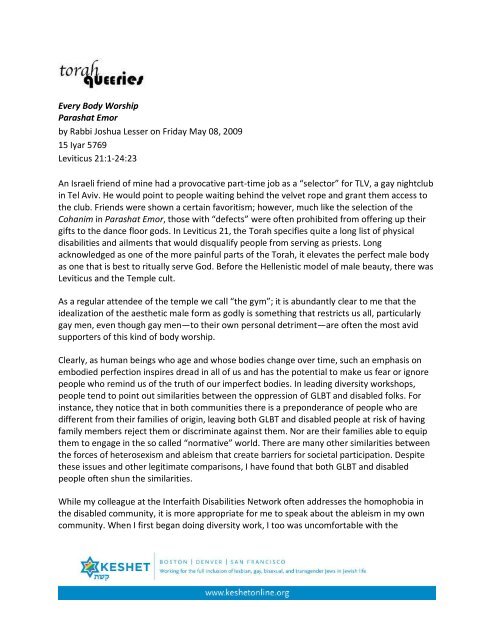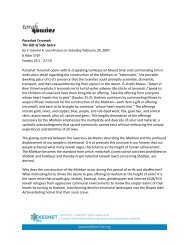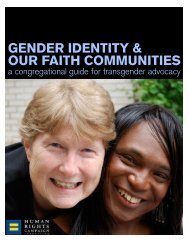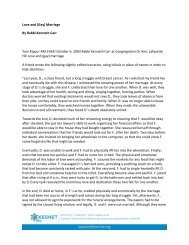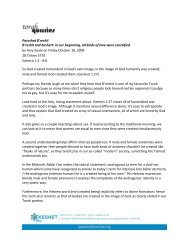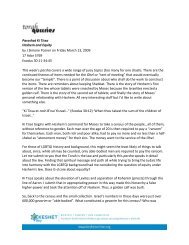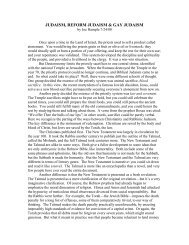Every Body Worship Parashat Emor by Rabbi Joshua ... - Keshet
Every Body Worship Parashat Emor by Rabbi Joshua ... - Keshet
Every Body Worship Parashat Emor by Rabbi Joshua ... - Keshet
Create successful ePaper yourself
Turn your PDF publications into a flip-book with our unique Google optimized e-Paper software.
<strong>Every</strong> <strong>Body</strong> <strong>Worship</strong><br />
<strong>Parashat</strong> <strong>Emor</strong><br />
<strong>by</strong> <strong>Rabbi</strong> <strong>Joshua</strong> Lesser on Friday May 08, 2009<br />
15 Iyar 5769<br />
Leviticus 21:1-24:23<br />
An Israeli friend of mine had a provocative part-time job as a “selector” for TLV, a gay nightclub<br />
in Tel Aviv. He would point to people waiting behind the velvet rope and grant them access to<br />
the club. Friends were shown a certain favoritism; however, much like the selection of the<br />
Cohanim in <strong>Parashat</strong> <strong>Emor</strong>, those with “defects” were often prohibited from offering up their<br />
gifts to the dance floor gods. In Leviticus 21, the Torah specifies quite a long list of physical<br />
disabilities and ailments that would disqualify people from serving as priests. Long<br />
acknowledged as one of the more painful parts of the Torah, it elevates the perfect male body<br />
as one that is best to ritually serve God. Before the Hellenistic model of male beauty, there was<br />
Leviticus and the Temple cult.<br />
As a regular attendee of the temple we call “the gym”; it is abundantly clear to me that the<br />
idealization of the aesthetic male form as godly is something that restricts us all, particularly<br />
gay men, even though gay men—to their own personal detriment—are often the most avid<br />
supporters of this kind of body worship.<br />
Clearly, as human beings who age and whose bodies change over time, such an emphasis on<br />
embodied perfection inspires dread in all of us and has the potential to make us fear or ignore<br />
people who remind us of the truth of our imperfect bodies. In leading diversity workshops,<br />
people tend to point out similarities between the oppression of GLBT and disabled folks. For<br />
instance, they notice that in both communities there is a preponderance of people who are<br />
different from their families of origin, leaving both GLBT and disabled people at risk of having<br />
family members reject them or discriminate against them. Nor are their families able to equip<br />
them to engage in the so called “normative” world. There are many other similarities between<br />
the forces of heterosexism and ableism that create barriers for societal participation. Despite<br />
these issues and other legitimate comparisons, I have found that both GLBT and disabled<br />
people often shun the similarities.<br />
While my colleague at the Interfaith Disabilities Network often addresses the homophobia in<br />
the disabled community, it is more appropriate for me to speak about the ableism in my own<br />
community. When I first began doing diversity work, I too was uncomfortable with the
comparison. Like other gay men, the comparison made me cringe because of my own body<br />
issues and my self perception that I was failing to live the gay ideal. I also said things like “being<br />
queer is an asset, not a liability,” to avoid having my sexual orientation be seen as a defect. I<br />
was missing a valuable point: whether or not I saw it as a disability; it is how others often<br />
perceive sexual orientation—as something lacking. Moreover, it reveals how I once saw people<br />
with disabilities—also as people with something lacking, instead of understanding that our<br />
society was deficient in its inability to adapt to the fullest range of human bodies and minds.<br />
When recognizing that it is society’s understanding that is what needs to change, it creates a<br />
clearer pathway for us to find each other as allies. Who better to understand each other in<br />
dealing with our parents’ (initial) disappointment when they discover their child is not who they<br />
had imagined? When we look at how some disabled people’s civil rights around marriage and<br />
adoption are limited in ways similar to gays and lesbians, who better to create solidarity? When<br />
looking at the history of persecution, particularly during the Nazi regime, we see that the same<br />
arguments, false logic and practices were used to target both communities. Both communities<br />
have had to redefine what sex means despite the larger community’s grave discomfort with<br />
thoughts of either group actually having sex. But it is my belief that everyone ultimately<br />
benefits from this conversation, especially if we listen. Furthermore, both communities are<br />
saying accept us as we are. We are created in God’s image as much as the perfect-bodied<br />
Cohanim and have lessons to teach the world.<br />
A few years ago, I was helping a child prepare for his bar mitzvah, which was on Shabbat <strong>Emor</strong>.<br />
As we were reading together the text from Vayikra/Leviticus, we came across the difficult part<br />
of the portion. As he read: “Adonai spoke further to Moses: . . .No man of your offspring<br />
throughout the ages who has a defect shall be qualified to offer the food of his God” ( Lev<br />
21:16-17) he looked at me said, “I wouldn’t have been able to be a Cohen back then, would I?”<br />
Asking why he felt this way, he responded, “Well, I have dyslexia pretty badly. That’s a defect,<br />
right?”<br />
This became the question we wrestled with for the rest of our preparation. He wanted to<br />
address this injustice, but another question emerged, perhaps even more challenging than the<br />
others. I asked him to think about how I view my queer identity, with all of its challenge and<br />
pain, as an asset, “What, if any benefits come with having dyslexia?”<br />
He looked puzzled at first and then he smiled. In his d’var Torah he ultimately spoke of how his<br />
dyslexia taught him to be more patient with others and a more compassionate person. This in<br />
turn made him a better brother, son and friend. Just as importantly, he defied Levitcus’ narrow<br />
recognition of perfection and saw himself just as deserving to be in part of God’s worship. For<br />
me, this is what we have in store when queers and disabled people are able to come together—<br />
more of God’s perfection is revealed to a society whose ability to recognize it, is limited.


